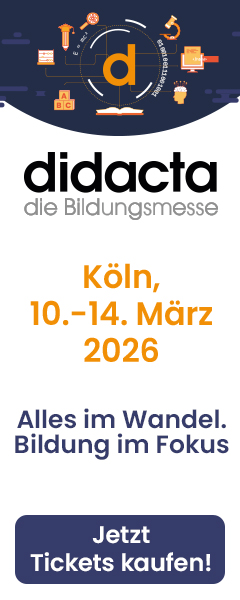Themen
European project
Online Training for Communication and Leadership
Berlin (GER), October 2011 - The German government's Gesellschaft für Internatioanle Zusammenarbeit (GIZ) GmbH recently organized an international Communication and Leadership Course in its GC21 E-Academy. During this project, candidates from Jordan, Kenya, and Zanzibar worked together in a virtual team. Most of the members were able to immediately integrate their experience into their daily work. » MORE
Commissioner's cynical comment
 London (UK), September 2011 - (by Bob Little) Among the key findings of a European Commission "Eurobarometer" survey on "Attitudes towards vocational education and training" are: Vocational education and training - in which nearly half of all Europeans choose to enrol after their compulsory education - has a generally positive image among most age groups. And: This is principally because it is seen as comprising high quality training and offers strong job prospects to those who do it.
» MORE
London (UK), September 2011 - (by Bob Little) Among the key findings of a European Commission "Eurobarometer" survey on "Attitudes towards vocational education and training" are: Vocational education and training - in which nearly half of all Europeans choose to enrol after their compulsory education - has a generally positive image among most age groups. And: This is principally because it is seen as comprising high quality training and offers strong job prospects to those who do it.
» MORE
Reviews and Awards for Open Educational Practices
 Duisburg/Essen (GER), October 2011 - The Open Educational Quality Initiative (OPAL) has introduced two tools for the quality assessment of Open Educational Resources (OER) - the OPAL Awards and the OPAL Register. » MORE
Duisburg/Essen (GER), October 2011 - The Open Educational Quality Initiative (OPAL) has introduced two tools for the quality assessment of Open Educational Resources (OER) - the OPAL Awards and the OPAL Register. » MORE
In-Service Training for European Cooperation Courses
Florence (IT), September 2011 - It is now possible to enroll in the 2012 editions of the European Project Planning and European Project Management in-service training courses addressed to individuals who wish to acquire the skills for successfully accessing and managing European funds in the field of education, training, and culture. » MORE
Gothenburg Region Joins iTEC Project
Gothenburg (SE), July 2011 - The European Schoolnet's iTEC project has welcomed an important new Associate Partner, the Gothenburg Region Association of Local Authorities (GR). The new partnership aims to strengthen scenario building in Sweden, as iTEC develops and validates scenarios for the school-space of the future in over 1,000 classrooms across fifteen countries in Europe. » MORE
Lived Experience of Climate Change (LECH-e)
 Milton Keynes (UK), July 2011 - The Lived Experience of Climate Change, an interdisciplinary project for the development of e-modules and virtual mobility (LECH-e) addresses education and lifelong learning in relation to climate change. Supported by the EU's Lifelong Learning Erasmus Programme, the project develops online curriculum materials and virtual learning communities. These resources will support Master's dissertations in the broad area of the lived experience of climate change. » MORE
Milton Keynes (UK), July 2011 - The Lived Experience of Climate Change, an interdisciplinary project for the development of e-modules and virtual mobility (LECH-e) addresses education and lifelong learning in relation to climate change. Supported by the EU's Lifelong Learning Erasmus Programme, the project develops online curriculum materials and virtual learning communities. These resources will support Master's dissertations in the broad area of the lived experience of climate change. » MORE
ELearning for Vocational Teachers Across Europe
 Coventry (UK), June 2011 - The purpose of iEducate - a project funded by the EU programme Leonardo da Vinci - is to educate vocational teachers in a range of eLearning methods, innovations, and technologies to better prepare them for a rapidly changing workplace and, hence, to connect them with a new generation of learners. » MORE
Coventry (UK), June 2011 - The purpose of iEducate - a project funded by the EU programme Leonardo da Vinci - is to educate vocational teachers in a range of eLearning methods, innovations, and technologies to better prepare them for a rapidly changing workplace and, hence, to connect them with a new generation of learners. » MORE
Launch of a New User-Oriented Platform
Brussels (BE), May 2011 - elearningeuropa.info, the European reference portal on education and technology, has launched its new platform. It is designed and built to be user centered and contains participatory tools to communicate, share, and discuss. » MORE
Launch of V2.0 of Online Tool for Quality in eLearning
 Brussels (BE), April 2011 - As a Key Activity 4 project supported by the European Commission Lifelong Learning Programme, SEVAQ+ is engaging in widespread dissemination and exploitation of a multilingual online tool for the self-evaluation of quality in technology-enhanced learning. By merging the Kirkpatrick evaluation framework with the EFQM quality model, SEVAQ+ has engineered a holistic tool and approach for the generation of customised evaluation questionnaires. » MORE
Brussels (BE), April 2011 - As a Key Activity 4 project supported by the European Commission Lifelong Learning Programme, SEVAQ+ is engaging in widespread dissemination and exploitation of a multilingual online tool for the self-evaluation of quality in technology-enhanced learning. By merging the Kirkpatrick evaluation framework with the EFQM quality model, SEVAQ+ has engineered a holistic tool and approach for the generation of customised evaluation questionnaires. » MORE
European Policy Cooperation Looks Ahead
Thessaloniki (GR)/Bruges (BE), January 2011 - At their informal meeting in Bruges in December, European Ministers of Education entrusted Cedefop with several tasks related to the next phase of policy cooperation. These include continued reporting on countries' progress in developing vocational education and training; help with the practical implementation of the common European tools and principles; continued commitment to analysing skill needs; and supporting the European Commission on issues such as adult education and work-based teaching and learning. » MORE










